MTA: Do new electronics need to play nice with legacy systems?
Marine Technology Advisors is really taking shape. You’ll find a new web site at that link, and better yet, the firm tells me that it’s getting some attention from marine electronics manufacturers and distributors. The following entry, like the ones in April, is based on last year’s survey, specifically where “integration” fit in when marine electronics buyers were asked to rank its importance versus other criteria like pricing, reliability, performance, and feature sets. Nearly 1,000 of you took the survey last year — which established some good base numbers — and starting tomorrow the 2011 survey will begin. Please come around whether you filled in the original or want to add your two cents.
Does Integration Matter?
Depends on the system. If you are talking about displays and controls, navigation or environmental sensors and instrumentation, it matters quite a lot. In 2/3 of MTA survey responses, “integration with legacy systems” was cited as the “most important” or “very important” product selection criteria for these solutions.
But switch focus to mobile devices or house systems, and it really does not matter much at all. The average importance rating ascribed to ‘integration’ for mobile or house systems was 2.51 and 2.58 respectively. That rating is on a 5.0 scale, where 3 is important, and 2 is not very important. In between these two clusters are all the other marine electronics solutions that MTA tracks, including communications, propulsion, entertainment, safety and electrical. Among these systems, the survey response varied widely.
Consider propulsion monitoring and control systems. Nearly 30% or respondents cited as the “most important” product selection criteria, at a 5.0 score. Yet, the average rating was only a 3.48. That means a LOT of people needed to score ‘integration’ close to a 2.0, or “not very important” to arrive at 3.48 across all respondents.
The point here: Consider the wide range of craft and cruising patterns of the survey respondents. Power and sail. Racing and cruising. Long and short voyage. At the same time, consider the varied rate of integration or replacement for various elements of powertrains, controls and monitoring systems. We are bound to have respondents that view propulsion monitoring and control as a minor issue for any one or many combination of the factors cited.
Take Away: Boats are not homes, or cars
Marine electronics suppliers would do well to apply this insight to their product development plan. Why? Because, if the data is accurate, then it serves as a reference of sorts — a requirements roadmap — for marine electronics product managers. This data hints at which devices drivers need to be written, which solutions from sensor and actuator catalogs should be supported, which physical envelopes and mechanical interconnects need to be honored.
These inputs are instructive for intermediaries — value-added distributors, boatyards, and others — as it helps these channels define which peripherals and accessories they should be stocking, integrating, and supporting. MTA will survey recreational users again, starting tomorrow, to refresh 2010-2012 budgets and capture 2010 actuals. This year, we will ask respondents for their actual Q1 spend to see if we can learn anything from that data.
Perhaps this kind of analysis will help accelerate the NMEA 2000 infrastructure market? After a year of private discussions with various perspectives in the market, we heard about many inspirations for the libraries of MNEA 2000 compliant solutions. Auto market. Home automation market. Personal electronics market.
But make no mistake, while the industrial automation market provided the baseline protocol for NMEA 2000, and other consumer electronics markets provide reference points; the marine electronics market has unique regulatory, operating environment and application requirements that are real.
Through this survey data, marine users are identifying their specific marine priorities and preferences. And that voice of the customer is precious for marine electronics product development and sales managers.
For you buyer-readers: Continue to be patient, you will be training suppliers for another product generation or two.


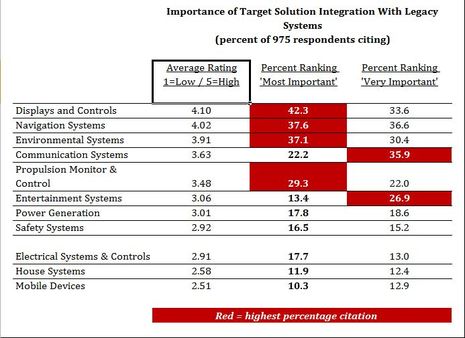
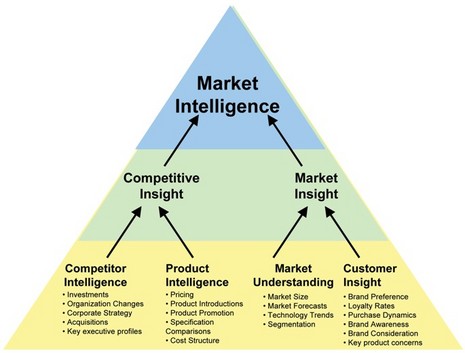
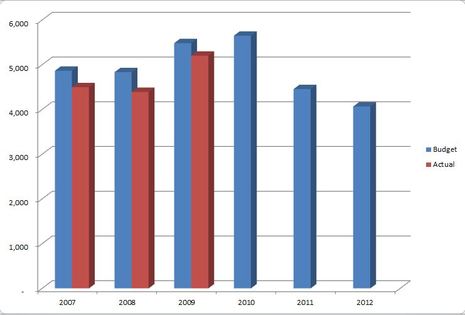
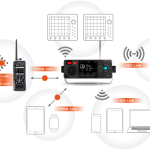
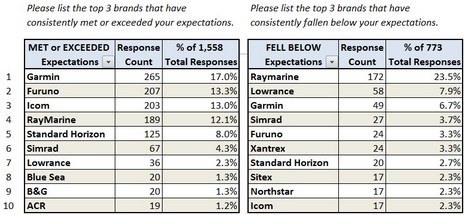








Assuming they are trainable.
I consider myself a pretty tech savy guy (I’ve helped program iPhone apps, decoded NMEA strings and built websites) which is why I’m so frustrated by Raymarine. For the life of me I can’t figure out integrating older raymarine devices with the seatalkNG system. The remote for my autopilot, for example, didn’t read the information from my gauges… so Iw as told to by a SeaTalk-SeaTalkNG converter… now the data shows on the remote but I can’t control the autopilot.
I’m not typically one to complain but… why don’t my Garmin, Furuno or Simrad systems ever run into these problems? I’d prefer NMEA 183 to the Raymarine mess I’m in. Or is it just me?
Ben, is there a fix for the spam notification issue? I never see spam on the site, but I routinely get emails notifying me of spam comments.
It’s a timing issue, Christopher, and we haven’t yet solved it. Email notifications go out when a comment enters the system, even if the comment hasn’t been approved yet. Of course I trash spam comments, but you’ve already been notified about them.
The good news is that very few spams get by the captcha process. We are working on a fix, but if the spam notifications really make your life difficult, all you have to do is uncheck “Receive email notifications of further comments” in a thread, or simply hit the “no longer wish to receive notifications” link at the bottom of one you receive.
Yes, that makes sense. What is potentially problematic for Panbo is its email address is beginning to be cross-correlated with spam body text in some Bayesian filtering systems.
When this happened early on, Panbo emails went to the Inbox, Now my email service sends them to the spam folder.
The problem with turning off notification is it turns off notification. Who’d want that?
It’s what white-lists are for. 😉
Reading the most recent MTA entry, https://panbo.com/archives/2011/05/mta_reliability_or_price_what_matters_most.html#more, has made this prior entry more clear to me, but somehow it dosn’t seem right that mobile devices are on the bottom of the list of importance with integration of legacy systems, and safety is on the top of the list.
Mobile devices on bottom –> I can see why it is on the bottom, certainly I am not going to decide between an iThing and an Android based on which will interface to my boats legacy system. However, if I answered the question “Do new electronics need to play nice with mobile devices, my answer would be yes for some categories of marine electronics.
Safety on top –> I think the result is incorrect, more likely an emotional response to the word “safety”. Why? Because it is exceptionally rare to come across a boat which has their DSC capable VHF interfaced to their GPS (to enable the DSC safety capabilities of the VHF.) Surely if it was important, boat owners could connect those two wires, program an MMSI number, etc.
Am i wrong ?
Dan:
Thank you for engaging this thread. We need the dialog. We are seeing dissonance in the market on the integration issue with many device categories, these two included.
At approx 300 survey responses for 2011, the numbers for importance of integration are:
1. Mobile: 2.52
2. Safety: 3.20
On Mobile: We would agree with you. Mobile devices do need to play nice with some systems. Is the low response rooted in the fact that the larger market (i.e. operator not likely classified as ‘power user’) is using their mobile device as a stand-along platform for redundant, new and experimental applications?
This would make sense to us, but, still not answer the core questions: requirement for integration and ease of integration.
Meanwhile layering in new mobile applications on top of existing infrastructure, even if redundant, is a safe, proven approach in a number of segments.
Could it be that the term integration is still read as largely a physical versus logical integration? And well, the point of having a mobile device is so that one does not need to be physically connected?
We are exploring your questions.
On safety: We see your points, but we think the market is moving a little faster here.
We also see safety as one of the strongest perfoming sub-segments in the market.
The investment in safety is in clearly defined product categories, myriad configurations and, yes, integration.
More coming.
Thank you.
My pleasure. I am confused, wouldn’t your comment about power users apply to safety products? It seems to me the non-power users are not at all interfacing safety systems to legacy systems (case in point VHF radios to GPS lat/long source)?
Had an interesting conversation with my friend and his sailboat HARD TACK. He is about to have his VHF serviced (remote microphone not working) by the yard, and has no interest in connecting it to his GPS despite having read articles promoting Rescue 21 and how to use it.
Dan, I’m confused too. Safety is NOT at the top of the “Importance of integration with legacy systems” results described in this entry. Check the table; Safety is below the middle with Displays and Controls at the top. Safety IS at the top of the “Sensitivity to RELIABILITY” results that you linked to, which makes sense. Did I misunderstand something here or did you get mixed up?
Gents:
Ben highlighted what is likely the confusion: Safety shows up below the mean and the median with respect to importance of integration withe legacy systems; but at the top in terms of reliability.
We saw Dan’s points and agreed, but, did not correct his ‘safety on top’ pretext. Our bad.
That said, it raises need for another point of clarification for our comments: We do not see current acute need, or significant near-term demand in change of need, for safety system integration generally.
However, we are seeing more interest in integrating multiple safety subsystems into a larger, coherent safety regime.
Which raises another interesting question for a new round of investigation: Integration into WHICH legacy systems?
Thank you.
For the life of me I cannot figure how I misread that.